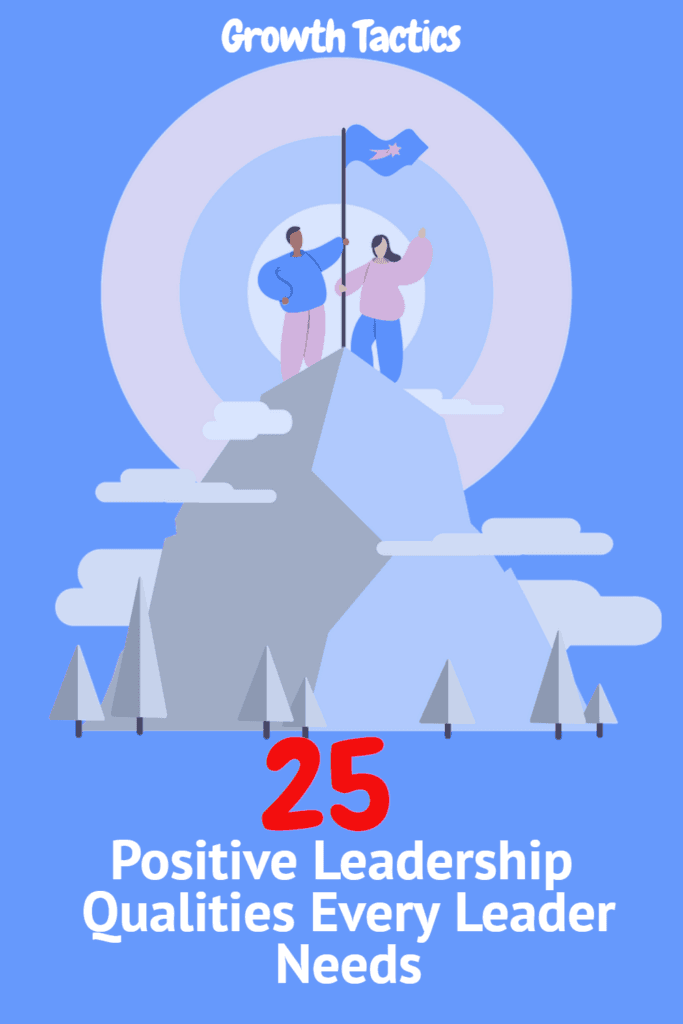Leadership is more than a title, it’s a mindset. If you want to lead effectively, you need to embody certain positive leadership qualities. These traits help you guide others and shape your own path. Drawing on insights from my leadership experiences, here are 25 leadership skills every good leader should cultivate.
Jump To Section
1. Integrity
Integrity means staying true to your values. It’s about doing what’s right, even when no one is watching. Leaders with integrity earn trust and respect.
How to Build Integrity:
- Know Your Values: Write down what you stand for. Reflect on these values often.
- Be Consistent: Act the same way in public and in private.
- Admit Mistakes: Own up when you’re wrong. Learn from it and move forward.
- Keep Promises: Always follow through on commitments.
2. Empathy
Empathy is understanding and sharing the feelings of others. It helps build strong relationships and improves communication.
How to Build Empathy:
- Listen Actively: Pay full attention when someone speaks. Nod and give feedback.
- Ask Questions: Show interest in other people’s experiences and feelings.
- Take Perspectives: Try to see situations from other points of view.
- Practice Patience: Give people the time they need to share their thoughts.
3. Resilience
Resilience is bouncing back from setbacks. Leaders face challenges head-on and learn from their failures.
How to Build Resilience:
- Stay Positive: Focus on solutions, not problems.
- Learn From Failure: Treat failure as a learning experience and use it as leadership development, not an endpoint.
- Seek Support: Don’t hesitate to ask for help. Teamwork strengthens resilience.
- Stay Healthy: Maintain physical health to help mental toughness. Exercise, rest, and nutrition matter.
4. Communication
Clear communication is an essential leadership skill. Leaders must convey their ideas effectively and listen to others.
How to Build Communication Skills:
- Be Clear and Concise: Get to the point quickly. Avoid jargon.
- Listen First: Understand before you speak.
- Use Multiple Channels: Use verbal, non-verbal, and written communication effectively.
- Be Open to Feedback: Accept positive and negative feedback to improve.
5. Vision
Vision is planning for the future. Great leaders have a clear idea of where they want to go and how to get there.
How to Build Vision:
- Set Goals: Define clear, achievable goals for yourself and your team.
- Stay Informed: Keep up with trends and changes in your field.
- Encourage Innovation: Be open to new ideas and solutions.
- Plan Strategically: Break down your vision into steps and follow through.
6. Humility
Humility is knowing your strengths and weaknesses. Positive leaders admit mistakes and learn from them showing true strength.
How to Build Humility:
- Seek Feedback: Regularly ask for honest feedback from team members, peers, and leaders.
- Acknowledge Mistakes: Don’t be afraid to own up when you’re wrong.
- Recognize Others: Give credit to your team and appreciate their efforts.
- Stay Grounded: Remember where you started and stay connected to your roots.
7. Accountability
Accountability is taking responsibility for your actions. It is a positive behavior that shows you’re reliable and trustworthy.
How to Build Accountability:
- Set Clear Goals: Make sure you understand what’s expected of you and your team.
- Follow Through: Do what you say you’ll do. Don’t make promises you can’t keep.
- Own Outcomes: Whether results are good or bad, take responsibility.
- Encourage Responsibility: Foster a culture where everyone is responsible for their actions.
8. Adaptability
Adaptability is being flexible in the face of change. Leaders must adjust their plans as new information arises.
How to Build Adaptability:
- Stay Open-Minded: Be willing to change your mind based on new information.
- Learn Continuously: Keep enhancing your skills and knowledge.
- Practice Flexibility: Be ready to shift tactics if something isn’t working.
- Embrace Change: See change as an opportunity rather than a threat.
9. Courage
Courage is standing up for what is right. It’s about making tough decisions and taking risks when necessary.
How to Build Courage:
- Take Risks: Don’t shy away from making bold decisions.
- Stand Your Ground: Defend your principles even when it’s hard.
- Be Decisive: Don’t delay tough choices—make informed decisions swiftly.
- Seek Support: Lean on mentors and colleagues when facing tough situations.
10. Optimism
Optimism is having a positive outlook. It motivates others and creates a hopeful environment.
How to Build Optimism:
- Focus on Solutions: Look for ways to solve problems rather than dwelling on them.
- Celebrate Successes: Acknowledge and celebrate wins, big and small.
- Encourage Positivity: Promote a can-do attitude in your team.
- Practice Gratitude: Regularly reflect on what you’re thankful for.
11. Commitment
Commitment is the dedication to the task. Leaders stay focused and follow through on their promises.
How to Build Commitment
- Set clear goals: Know what you are aiming for and why it’s important.
- Break tasks into steps: Smaller steps make big tasks easier to manage.
- Hold yourself accountable: Prioritize your promises.
12. Respect
Respect is valuing others’ viewpoints. It fosters a culture of inclusivity and cooperation.
How to Build Respect
- Listen attentively: Pay real attention when others speak.
- Show empathy: Put yourself in others’ shoes.
- Recognize unique experiences: Everyone’s experience is important.
13. Patience
Patience is handling situations with calmness. It helps in decision-making and managing stress.
How to Build Patience
- Slow down: Take deep breaths when you feel rushed.
- Stay present: Focus on the task at hand, not the next one.
- Reflect on past successes: Remember when patience paid off.
14. Innovation
Innovation is thinking creatively. Leaders find new ways to solve problems and improve processes.
How to Build Innovation
- Always ask questions: Seek new information. Create a culture of innovation.
- Encourage brainstorming: Hold sessions with your team to bring positive change.
- Think outside the box: Be open to unconventional ideas.
15. Teamwork
Teamwork is working well with others. It leverages everyone’s strengths for better results.
How to Build Teamwork
- Understand strengths and weaknesses: Know your team and empower them.
- Encourage communication: Be open and willing to collaborate.
- Share workload fairly: Give credit where it’s due.
16. Dependability
Dependability is being reliable. People can count on dependable leaders to deliver what they promise.
How to Build Dependability
- Be consistent: Follow through on your commitments. If you say you’ll do something, make sure you do it.
- Communicate clearly: Make sure everyone knows what to expect and when.
- Manage time effectively: Prioritize your tasks to meet deadlines.
- Practice integrity: Be honest and transparent in your actions.
17. Fairness
Fairness is treating everyone equally. It creates a just environment where people feel valued.
How to Build Fairness
- Listen to all sides: Give everyone a chance to share their perspective.
- Avoid favoritism: Treat everyone the same, regardless of your personal feelings.
- Be transparent: Explain your decisions and the reasons behind them.
- Use objective criteria: Make decisions based on facts, not opinions.
18. Mentorship
Mentorship is guiding and developing others. It helps build the next generation of leaders.
How to Build Mentorship
- Be approachable: Make yourself available to others.
- Share your experiences: Offer insights from your own journey.
- Encourage questions: Foster a learning environment where curiosity is welcomed.
- Give constructive feedback: Help others improve with clear and kind advice.
19. Decisiveness
Decisiveness is making sound decisions promptly. It shows confidence and efficiency.
How to Build Decisiveness
- Gather information: Make informed decisions by knowing all the facts.
- Trust your instincts: Confidence comes from experience and intuition.
- Set deadlines: Give yourself a timeframe to make decisions.
- Learn from the past: Reflect on previous decisions to improve future ones.
- Air Force mindset: Pilots make quick, well-informed decisions. Practice making decisions confidently under pressure.
20. Inspirational
Being inspirational means motivating others to achieve more. Leaders set an example through their actions and words.
How to Build Inspiration
- Lead by example: Your actions speak louder than words.
- Share your vision: Clearly communicate your goals and the purpose behind them.
- Show enthusiasm: Passion is contagious. Be excited about what you do.
- Celebrate achievements: Recognize and reward the successes of others.
21. Emotional Intelligence
Emotional intelligence is managing emotions wisely. It helps in conflict resolution and relationship building.
How to Build Emotional Intelligence
- Know your emotions: Take time each day to reflect on how you feel.
- Practice empathy: Try to understand how others feel in different situations.
- Stay calm under pressure: Learn techniques like deep breathing to help you stay composed.
- Listen actively: Pay attention when others speak and acknowledge their feelings.
22. Problem-Solving
Problem-solving is finding effective solutions. Leaders tackle issues head-on and think critically.
How to Build Problem-Solving Skills
- Define the problem clearly: Understand exactly what you’re dealing with.
- Gather information: Look at all the facts before deciding what to do.
- Brainstorm solutions: Think of as many ideas as possible without judging them.
- Evaluate and choose: Pick the best solution and act on it.
23. Transparency
Transparency is being open and honest. It builds trust and ensures everyone is on the same page.
How to Build Transparency
- Communicate openly: Share important information with your team regularly.
- Be honest about mistakes: Own up to errors and discuss how to avoid them in the future.
- Explain decisions: Let others know why certain choices were made.
- Encourage feedback: Ask for and listen to others’ opinions.
24. Passion
Passion is having enthusiasm and drive. It energizes the team and drives productivity.
How to Build Passion
- Find your purpose: Know why you’re doing what you do.
- Set goals: Have clear, achievable objectives.
- Stay curious: Always look for new things to learn and ways to improve.
- Share your excitement: Let others see how excited you are about your work.
25. Self-Awareness
Self-awareness is understanding your emotions and triggers. It helps in personal growth and effective leadership.
How to Build Self-Awareness
- Reflect regularly: Take time to think about your actions and feelings.
- Seek feedback: Ask others for their perspectives on your behavior and performance.
- Understand your strengths and weaknesses: Know what you’re good at and where you can improve.
- Practice mindfulness: Stay present and aware of your thoughts and habits.
Rounding Out the Positive Leadership Qualities
Leadership starts with understanding yourself and cultivating positive qualities. Integrate these 25 traits into your leadership style. You’ll guide not only others but also yourself to greater heights. Remember, having a purpose in everything you do makes all the difference.
Stay true, stay inspired, and lead with heart.


